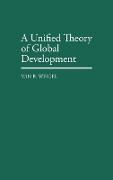A Unified Theory of Global Development
BücherAngebote / Angebote:
In a bold attempt to formulate a tentative, unified conceptual framework for the study of global development, the author tries to integrate numerous contributions from a variety of fields, including economics, sociology, anthropology, political science, moral philosophy, sociobiology, neurobiology, and others. He regrets the present compartmentalization of study of this topic, which leads to a lack of perspective in dealing with crucial planetary problems...Truly an ambitious and courageous effort and a worthy project. Recommended for academic and public library collections dealing with development. Choice This book breaks important new ground in the international debate over development by presenting the first systematic attempt to map a unified theory of global development. Drawing from the fields of economics, sociology, political science, philosophy, and ethics, the author presents a unique cross-disciplinary perspective on international development that features a number of new concepts and approaches to development studies.
Building upon a synthesis of three independent developments of the 1970s, Weigel contends that it is possible to construct a universal development norm and a universal moral principle which retain their credibility in both cross-cultural and transhistorical contexts. He argues further that when these principles are linked to a well-differentiated theory of basic human needs they provide a powerful normative framework for the integration of economic and political rights which can guide policymakers well into the 21st century. Certain to spark new debate among academicians and policymakers, Weigel's work makes a number of significant contributions, including: a comprehensive synthesis between moral philosophy and development studies, the most elaborate philosophical defense of the I.L.O
's 'Basic Needs Approach' to date, an analysis of the nuclear arms race which utilizes the concept of stable strategies and presents a new theory of nuclear deterrence, a macroeconomic framework for basic needs program, an analysis of global parameters for development assistance, country studies which demonstrate the feasibility of Basic Needs programs for low-income countries, the application of the theory to a wide variety of topic areas such as paternalism, population control policies, the problem of political legitimation, and economic policies. Throughout, the author focuses on the concept of basic needs, arguing that the satisfaction of basic human needs must be the touchstone of all future development policies.
Folgt in ca. 15 Arbeitstagen




